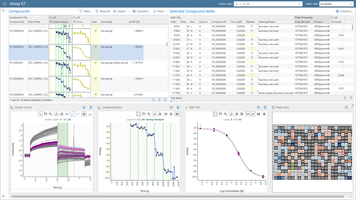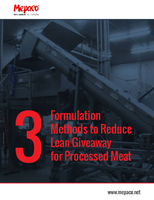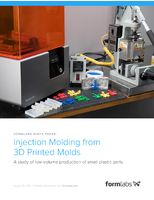New Genedata Screener 17.0 Supports Biomolecule Quantification and Characterization of Binding Kinetics
Press Release Summary:

- Suitable for automated analysis, visualization and management of screening data from all in-vitro screening assay technologies
- Include the embedding of experimental data in its biological context for advanced decision support and reporting
- Supports biolayer interferometry (BLI) quantification assays in large molecule workflows, computing sample concentrations from this technique
Original Press Release:
New Genedata Screener Release Features Advanced Assay Registration and Decision Support for Biopharma R&D
End-to-end solution structures and automates information flow from experiments all the way to project decisions
Basel, Switzerland – May 28, 2020 – Genedata, the leading provider of enterprise software solutions for biopharmaceutical R&D, today announced the release of Genedata Screener® 17.0, the latest version of its enterprise software for the automated analysis, visualization, and management of screening data from all in-vitro screening assay technologies. Genedata will host a webinar on June 10, 2020, detailing and demonstrating the features and benefits of the new software release.
Highlights of Genedata Screener 17.0 include the embedding of experimental data in its biological context for advanced decision support and reporting, increased time savings through further automation of data capture and analysis, new biomolecule quantification and characterization methods for experiments using biolayer interferometry or high throughput flow cytometry, and extension of the unmatched technology coverage of the software by adding analyses for transcriptomic screening assays.
The new Assay Catalog in Genedata Screener 17.0 allows the definition of terminology for assays, annotations, and result types, registers assays, and connects experimental data to them, thus enabling automated and AI-supported downstream analysis. From simple to complex assays, Assay Catalog consistently captures assay biology and experimental conditions and links screening data to them. An important infrastructure complement to the data analysis and management modules in Genedata Screener, Assay Catalog places rich experimental data into biological context, straight out of the box.
With the new release, Hit Profiler, the query and reporting module in Genedata Screener, compiles rich screening results in real time from experiments across the organization into structured, interactive, scalable views and reports. Now displaying rich and relevant experimental results in biological context with detailed visualizations such as dose–response curves, kinetic traces, and sensorgrams, Hit Profiler allows earlier, deeper characterization of actives, hits, and leads in the discovery process, and provides support for progression decisions.
Genedata Screener 17.0 further automates screening and analysis processes for large molecule discovery and development. It features expanded support for biomolecule quantification and characterization of binding kinetics. The new release supports biolayer interferometry (BLI) quantification assays in large molecule workflows, computing sample concentrations from this technique. Enhanced quality control and interactive visualization capabilities in high throughput flow cytometry—a critical technique for large molecule discovery—add further value to the automated analysis of large molecule campaigns with Genedata Screener.
The new Genedata Screener also adds substantial time savings through process automation and standardization. High content screening (HCS) images are now automatically uploaded in real time into Genedata Screener 17.0, as they come off the instruments. Users can monitor HCS progress on a dashboard, or simply receive status notifications. A fully automated workflow—from image capture, through image analysis and data analysis, to reporting to a corporate data warehouse—can be set up by combining Genedata Screener 17.0 with the recently released Genedata Imagence® 2.0, both parts of the Genedata Biopharma Platform.
In addition to the new technologies already noted, Genedata Screener 17.0 enables transcriptomic screening analysis, adding a new source of information for educated decision making when selecting drug candidates for further investigation. The software quantifies high throughput multiplexed gene expression data after compound treatment. Time-consuming, error-prone steps like normalization and quality control are automated, resulting in immediate, accurate display of key results.
“Genedata Screener 17.0 represents a major step forward to automating screening workflows,” noted Othmar Pfannes, Ph.D., CEO of Genedata. “With this latest release we also strengthen the application of Genedata Screener to large molecule screening experiments, and extend its already unmatched screening technology coverage. This release is further proof of our commitment to help our customers globally become more efficient in their R&D.”
Editorial note
On June 10, 2020, Genedata will host a webinar, “What’s New in Genedata Screener 17.0”, detailing and demonstrating the new features and benefits of the new software release. To register for the webinar, please email your name, title and company name to screener@genedata.com.
About Genedata
Genedata transforms data into intelligence with innovative software solutions and domain-specific consulting services that automate complex, large-scale experimental processes and enable organizations to maximize the ROI in their R&D, spanning early discovery all the way to the clinic. Founded in 1997, Genedata is headquartered in Switzerland with additional offices in Germany, Japan, Singapore, the UK, and the US.
Contact:
Miles Fisher-Pollard
Genedata
Public Relations
Phone: +41 61 511 85 61
pr@genedata.com




